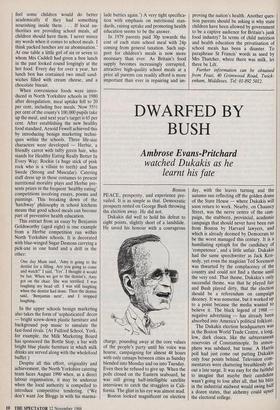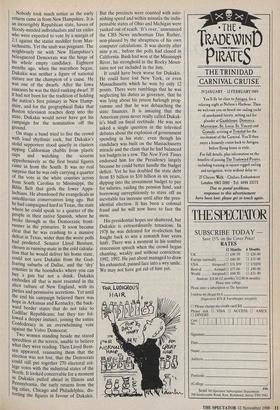DWARFED BY BUSH
Ambrose Evans-Pritchard watched Dukakis as he learnt his fate
Boston PEACE, prosperity, and experience pre- vailed. It is as simple as that. Democratic prospects rested on George Bush throwing the election away. He did not.
Dukakis did well to hold his defeat to eight points, slightly short of a landslide. He saved his honour with a courageous charge, pounding away at the core values of the people's party until his voice was hoarse, campaigning for almost 48 hours with only catnaps between cities as Sunday blended into Monday and on into Tuesday. Even then he refused to give up. When the polls closed on the Eastern seaboard, he was still giving half-intelligible satellite interviews to catch the stragglers in Cali- fornia. The glint in his eye was almost mad.
Boston looked magnificent on election day, with the leaves turning and the autumn sun reflecting off the golden dome of the State House — where Dukakis will soon return to work. Nearby, on Chauncy Street, was the nerve centre of the cam- paign, the stubborn, provincial, academic campaign that should never have been run from Boston by Harvard lawyers, and which is already deemed by Democrats to be the worst managed this century. It is a humiliating epitaph for the candidacy of 'competence', and a little unfair. Dukakis had the same speechwriter as Jack Ken- nedy, yet even the magician Ted Sorenson was thwarted by the complacency of the country and could not find a theme until the very end. That theme, Dukakis's only successful theme, was that he played fair and Bush played dirty, that the election should be a referendum on campaign decency. It was nonsense, but it worked up to a point because the media wanted to believe it. The black legend of 1988 — negative advertising — has already been absorbed into America's political folklore. The Dukakis election headquarters was in the Boston World Trade Centre, a long, low, dark cloaca, like the subterranean reservoirs of Constantinople. Its atmos- phere was subdued, but tense. A Harris poll had just come out putting Dukakis only four points behind. Television com- mentators were chattering breathlessly ab- out a late surge. It was easy for the faithful to imagine that maybe their candidate wasn't going to lose after all, that his blitz in the industrial midwest would swing half a dozen states, that alchemy could upset the electoral college. Nobody took much notice as the early • returns came in from New Hampshire. It is Eli incorrigibly Republican state, haven of bloody-minded individualists and tax exiles who were expected to vote by a margin of 2:1 against the statist meddler from Mas- sachusetts. Yet the snub was poignant. The neighbourly tie with New Hampshire's beleaguered Democrats was the hinge of his whole empty candidacy. Eighteen months ago, when the marathon began, Dukakis was neither a figure of national stature nor the champion of a cause. He was one of the dwarfs. After the Iowa caucuses he was the third-ranking dwarf. If it had not been for the tradition of holding the nation's first primary in New Hamp- shire, and. for the geographical fluke that Boston television reaches deep into the state, Dukakis would never have got his campaign for the nomination off the ground.
On stage a band tried to fire the crowd With loud rhythmic rock, but Dukakis's stolid supporters stood quietly in clusters Sipping Californian chablis from plastic cups and watching the• screens apprehensively as the first brutal figures came in from the South. It was no real surprise that he was only carrying a quarter of the vote in the white counties across from South Carolina to Mississippi, the Bible Belt that girds the lower Appa- lachians. He abandoned the evangelicals as antediluvian conservatives long ago. But he had campaigned hard in Texas, the state where he could speak to a quarter of the people in their °native Spanish, where he broke through as the Democratic front- runner in the primaries. It soon became clear that he was crashing to a massive defeat in Texas, wider than the worst polls had predicted. Senator Lloyd Bentsen, Chosen as running-mate in the cold calcula- tion that he would deliver his home state, Could not save Dukakis from the God- fearing suburbs of Dallas, and the 'dry' counties in the boondocks where you can buy a gun but not a drink. Dukakis embodies all that is most resented in the alien culture of New England, with its pieties and permissive accretions. Yet until the end his campaign believed there was hope in Arkansas and Kentucky, the back- ward border states that do not take to Cadillac Republicans; but they too fol- lowed a deeper instinct, joining the entire Confederacy in an overwhelming vote against the Volvo Democrat.
Two women standing beside me stared Speechless at the screen, unable to believe what they were reading. Then Lloyd Bent- sen appeared, reassuring them that the election was not lost, that the Democrats could still put together 270 electoral col- lege votes with the industrial states of the North. It looked conceivable for a moment as Dukakis pulled ahead in Illinois and Pennsylvania, the early returns from the big cities, Chicago and Philadelphia, dis- torting the figures in favour of Dukakis.
But the precincts were counted with asto- nishing speed and within minutes the indis- pensable states of Ohio and Michigan were yanked out of reach. 'It's Over,' announced the CBS News anchorman Dan Rather, non-plussed by the abruptness of his own computer calculations. It was shortly after nine p.m., before the polls had closed in California. Bush had won at the Mississippi River, his stronghold in the Rocky Moun- tains not yet included in the lists.
It could have been worse for Dukakis. He could have lost New York, or even Massachusetts which he won by only 12 points. There were rumblings that he wag neglecting his duties as governor, that he was lying about his prison furlough prog- ramme and that he was debauching the state finances. It is amazing that the American press never really called Dukak- is's bluff on fiscal rectitude. He was not asked a single question in the televised debates about the explosion of government spending in his state, even though his candidacy was built on the Massachusetts miracle and the claim that he had balanced ten budgets in a row. The New York Times endorsed him for the Presidency largely because he could better handle the budget deficit. Yet he has doubled the state debt from $5 billion to $10 billion in six years, dipping into the investment budget to pay for salaries, raiding the pension fund, and borrowing surreptitiously to stave off an inevitable :t increase until after the pres- idential election. It has been a colossal fraud and he will now have to face the mess.
His presidential hopes are shattered, but Dukakis is extraordinarily tenacious. In 1970 he was defeated for re-election but fought back to win a rematch four years tat& There was a moment in his sombre concession speech when the crowd began chanting, weakly and without conviction: 1992,1992. He just about managed to draw his exhausted, pained face into a wry smile. We may not have got rid of him yet.











































































 Previous page
Previous page